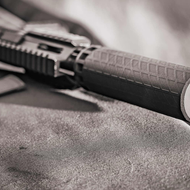How to Choose the Best Suppressor for Hunting
Nov 23rd 2024
For hunters, choosing the right suppressor can make all the difference in the field. Suppressors not only protect your hearing but also enhance stealth by reducing noise, muzzle blast, and recoil. With a wide array of options on the market, selecting the best suppressor for hunting involves balancing sound reduction, weight, durability, and legal considerations. Here’s everything you need to know to make the right choice.
Why Use a Suppressor for Hunting?
Hunting with a suppressor offers multiple advantages:
- Hearing Protection: Suppressors reduce the decibel level of gunfire, protecting your hearing without requiring bulky ear protection.
- Reduced Noise Pollution: Suppressors help maintain a quieter hunting environment, minimizing disturbance to wildlife and nearby communities.
- Improved Accuracy: By reducing recoil and muzzle blast, suppressors help you stay on target for faster and more accurate follow-up shots.
- Better Stealth: A quieter shot decreases the chance of alerting game, especially in areas with multiple targets.
Key Factors to Consider
When selecting a suppressor for hunting, keep these critical factors in mind:
1. Caliber Compatibility
Choose a suppressor that matches or exceeds the caliber of your hunting rifle. For example:
- Dedicated Caliber Suppressors: Designed for specific rounds like .30-06, .308 Winchester, or .223 Remington, these suppressors offer optimal sound reduction for their intended caliber.
- Multi-Caliber Suppressors: These are versatile options that cover a range of calibers, such as a .30-caliber suppressor that can also handle smaller rounds like 6.5 Creedmoor or .243 Winchester. This versatility is ideal for hunters with multiple firearms.
Always verify that the suppressor is rated for the caliber and pressure of your ammunition to ensure safety and performance.
2. Weight and Size
Hunting often involves carrying your firearm over long distances, so the weight and size of the suppressor are critical considerations:
- Lightweight Suppressors: Titanium suppressors are an excellent choice for hunters due to their light weight and corrosion resistance. They minimize added bulk, making your rifle easier to maneuver.
- Compact Designs: Shorter suppressors reduce the overall length of your firearm, improving balance and ease of handling in dense brush or tight spaces.
Strike a balance between sound reduction and portability. While larger suppressors may offer better sound suppression, they can be cumbersome for extended hunts.
3. Sound Suppression
Effective sound suppression is essential for maintaining stealth and protecting your hearing. Look for suppressors with tested decibel reduction ratings, especially if you’re hunting with larger calibers.
- Subsonic Ammunition: Pairing your suppressor with subsonic rounds can further reduce noise levels. Subsonic ammo travels below the speed of sound, eliminating the sonic crack produced by supersonic rounds.
- First-Round Pop (FRP): Suppressors designed to minimize FRP are ideal for hunting, as they ensure quieter shots from the start.
4. Durability and Material
Durability is a crucial factor, especially for hunters who venture into rugged environments. Consider these materials:
- Titanium: Lightweight, corrosion-resistant, and durable, titanium is perfect for hunting in wet or harsh conditions.
- Stainless Steel: Offers excellent durability and affordability but is heavier than titanium.
- Hybrid Designs: Combine lightweight materials with durable components for optimal performance and longevity.
Ensure the suppressor can withstand repeated shots without compromising performance, especially if you’re hunting in extreme conditions.
5. Mounting System
Suppressors use different mounting systems, and choosing the right one ensures reliability and ease of use:
- Direct-Thread Suppressors: Simple and secure, these are a great choice for hunting rifles and provide a tight fit that prevents loosening during use.
- Quick-Detach (QD) Mounts: Offer faster attachment and removal, ideal for hunters who frequently switch between suppressed and unsuppressed shooting.
Ensure the suppressor’s mount is compatible with your rifle’s muzzle thread. Common thread sizes include 1/2x28 for smaller calibers and 5/8x24 for larger calibers.
6. Legal Considerations
Suppressor ownership and use are subject to federal and state laws:
- ATF Approval: Purchasing a suppressor requires submitting ATF Form 4, paying a $200 tax stamp, and waiting for approval.
- State Laws: While suppressors are legal for hunting in most states, restrictions still exist in some areas. Verify local laws before purchasing or using a suppressor.
Top Suppressor Features for Hunting
When evaluating suppressors, prioritize these features:
- Lightweight Construction: Choose materials like titanium for minimal weight impact.
- Minimal First-Round Pop: Ideal for maintaining stealth during the initial shot.
- Ease of Maintenance: Look for suppressors with coatings like DLC or hBN that resist carbon buildup and simplify cleaning.
- Weather Resistance: Durable coatings and materials ensure performance in rain, snow, or humid environments.
Recommended Suppressors for Hunting
1. Multi-Caliber Suppressors
- Best For: Hunters with multiple firearms in different calibers.
- Why: These suppressors are versatile and cost-effective, allowing you to use one suppressor across a variety of rifles.
2. Caliber-Specific Suppressors
- Best For: Precision hunting with a single firearm.
- Why: Dedicated suppressors provide optimal sound reduction and performance tailored to your rifle and ammunition.
Maintenance Tips for Hunting Suppressors
Keeping your suppressor clean and well-maintained ensures peak performance during hunting trips:
- Clean Regularly: Use ultrasonic cleaners or soak the suppressor in a solution like diluted Simple Green to remove carbon buildup.
- Protect the Threads: Apply anti-seize to the threads to prevent sticking, especially after extended use in the field.
- Store Properly: Keep your suppressor dry and protected in a case when not in use.
Final Thoughts
Selecting the best suppressor for hunting involves considering factors like caliber compatibility, weight, sound suppression, and durability. A well-chosen suppressor not only enhances your hunting experience but also protects your hearing and improves your accuracy. By understanding your specific needs and the options available, you can find the perfect suppressor to accompany you on every hunt.
Ready to elevate your hunting game? Explore Echo Zulu Defense’s lineup of lightweight and durable suppressors designed to meet the unique demands of hunters. From versatile multi-caliber designs to caliber-specific precision, we’ve got you covered.

